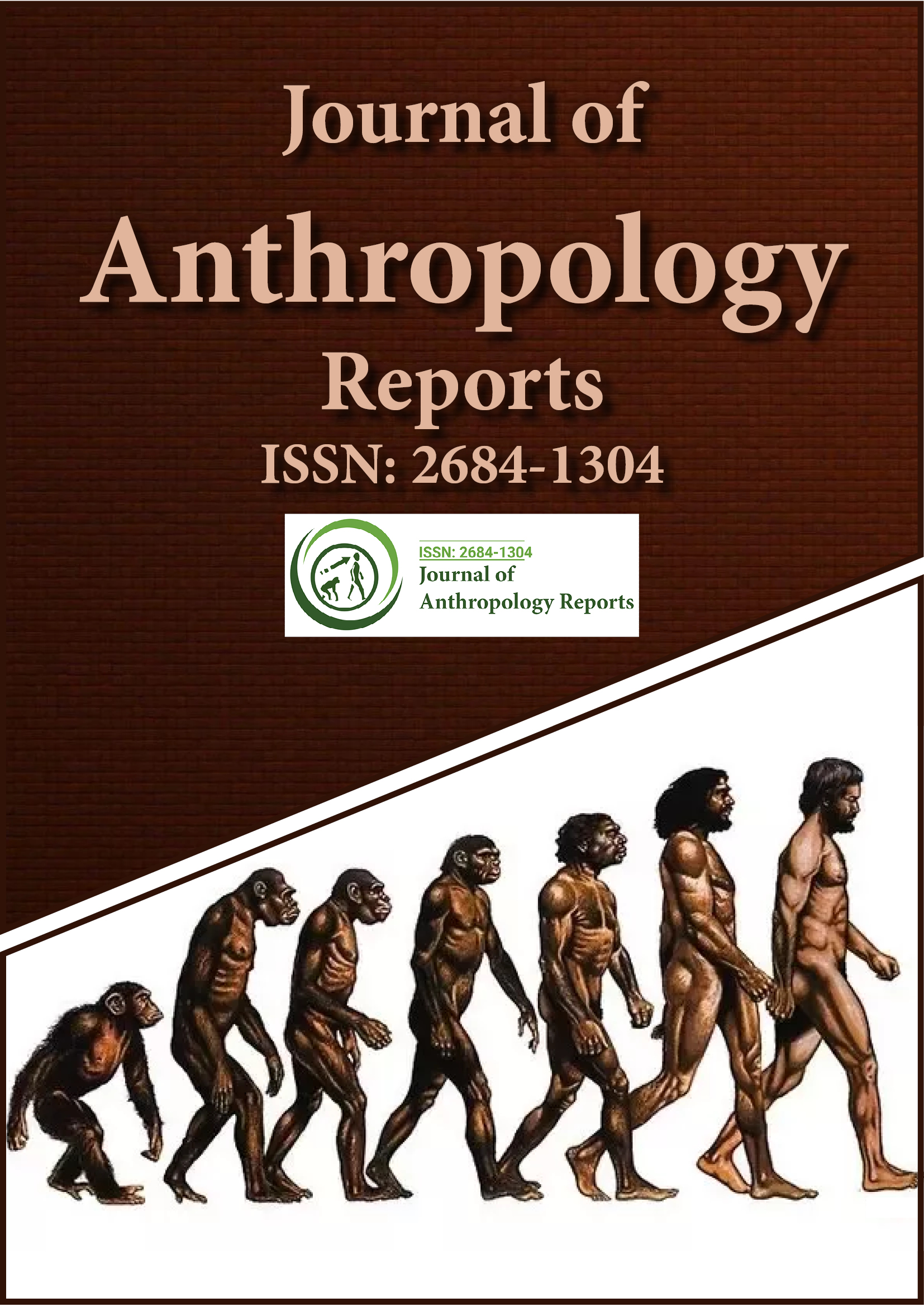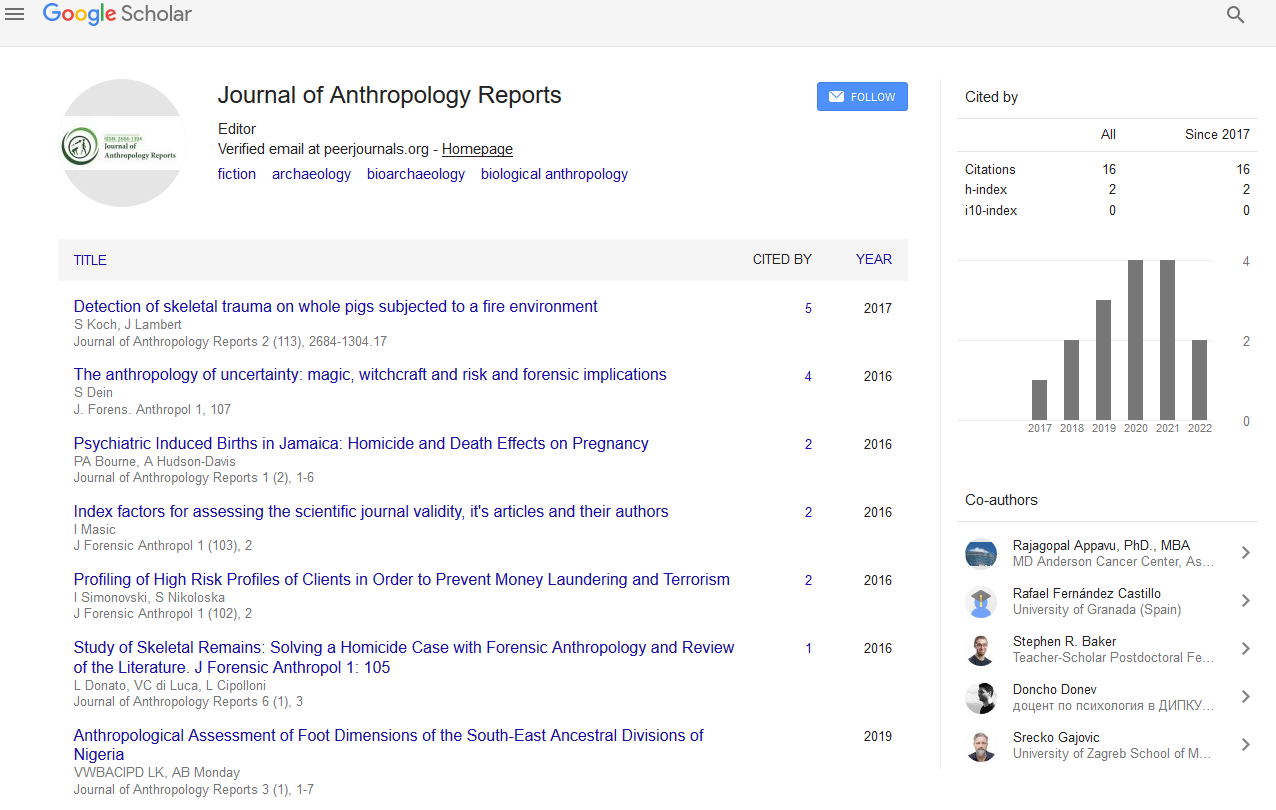Indexed In
- RefSeek
- Hamdard University
- EBSCO A-Z
Useful Links
Share This Page
Journal Flyer

Open Access Journals
- Agri and Aquaculture
- Biochemistry
- Bioinformatics & Systems Biology
- Business & Management
- Chemistry
- Clinical Sciences
- Engineering
- Food & Nutrition
- General Science
- Genetics & Molecular Biology
- Immunology & Microbiology
- Medical Sciences
- Neuroscience & Psychology
- Nursing & Health Care
- Pharmaceutical Sciences
Opinion Article - (2024) Volume 7, Issue 4
Health, Culture and Society: The Transformative Role of Medical Anthropology in Global Healthcare
Amelia Curtis*Received: 29-Nov-2024, Manuscript No. JFA-24-28385; Editor assigned: 02-Dec-2024, Pre QC No. JFA-24-28385 (PQ); Reviewed: 16-Dec-2024, QC No. JFA-24-28385; Revised: 23-Dec-2024, Manuscript No. JFA-24-28385 (R); Published: 30-Dec-2024, DOI: 10.35248/2684-1304.24.7.209
Description
Medical anthropology, as a subfield of anthropology, investigates the intersection between health, illness and culture, providing valuable insights into how different societies conceptualize, experience and responds to health and disease. This discipline has evolved significantly over the past several decades, providing critical perspectives that shape the way healthcare is understood and practiced worldwide. The field’s strength lies in linking individual experiences of illness with broader social structures and systems, providing a unique socio-cultural lens through which health and healthcare can be examined.
At the heart of medical anthropology is the understanding that health is not merely a biological condition but a deeply social phenomenon. Medical anthropologists investigate how cultural beliefs, social norms, economic inequalities and political systems influence health. By focusing on how different societies interpret health, medical anthropology broadens the scope of healthcare studies beyond the confines of Western medical models. For example, anthropologists study how diverse cultures perceive mental illness, healing practices and disease prevention, offering insights into the cultural contexts that shape healthcare practices in various parts of the world.
The field is particularly effective in examining how local practices of health and healing intersect with formal healthcare systems. While medical science has made significant advancements, the practices of local, indigenous and traditional healers continue to play an important role in many communities’ health systems. Medical anthropologists document and explore these practices, often highlighting the integration of traditional medicine with biomedicine. This approach emphasizes the value of indigenous knowledge, showing that it is not merely a relic of the past but an ongoing, dynamic system of care that holds critical relevance for today’s health challenges.
In addition to focusing on local health practices, medical anthropology has expanded its influence in the context of global health challenges, such as pandemics, infectious diseases and climate change. As health problems transcend national borders, medical anthropologists have provided valuable insights into how cultural beliefs and practices influence the effectiveness of global health interventions. Understanding how people in different parts of the world perceive diseases and treatment protocols can help to craft more culturally sensitive health interventions that are likely to be better received and more effective.
Another significant contribution of medical anthropology is its critique of the medicalization of health, which refers to the tendency to treat a wide range of human behaviors and experiences as medical issues requiring clinical intervention. Medical anthropologists argue that this shift toward medicalization can result in overdiagnosis and the overuse of medications, particularly in cultures where biomedical approaches dominate. By exploring the lived experiences of patients, medical anthropologists offer an alternative view that includes the emotional, social and psychological dimensions of health, which are often overlooked in purely biomedical models. This critique has helped to highlight the limitations of clinical practices that fail to account for the broader social and environmental determinants of health.
Medical anthropology also addresses issues of health equity, focusing on how social inequalities-such as race, gender, class and disability-affect access to healthcare and health outcomes. By examining the social factors that contribute to disparities in health, medical anthropologists advocate for policies that prioritize equitable healthcare delivery. This perspective is essential for addressing the growing health disparities that exist not only within countries but also between different regions of the world. Medical anthropology’s focus on social determinants of health has led to more holistic approaches to healthcare that integrate social, economic and cultural factors with clinical treatment.
In conclusion, medical anthropology continues to make invaluable contributions to the understanding of health by offering a socio-cultural perspective that goes beyond the biological aspects of illness. By examining the social, cultural and economic factors that shape health, medical anthropology provides a more comprehensive view of healthcare that incorporates diverse forms of knowledge, including traditional healing practices and global health concerns. The field’s interdisciplinary approach and its focus on health equity ensure that medical anthropology remains a critical component of the broader conversation on health and well-being, advocating for more inclusive, culturally sensitive and effective healthcare systems.
Citation: Curtis A (2024). Health, Culture and Society: The Transformative Role of Medical Anthropology in Global Healthcare. J Anthropology Rep. 7:209.
Copyright: © 2024 Curtis A. This is an open-access article distributed under the terms of the Creative Commons Attribution License, which permits unrestricted use, distribution, and reproduction in any medium, provided the original author and source are credited.

